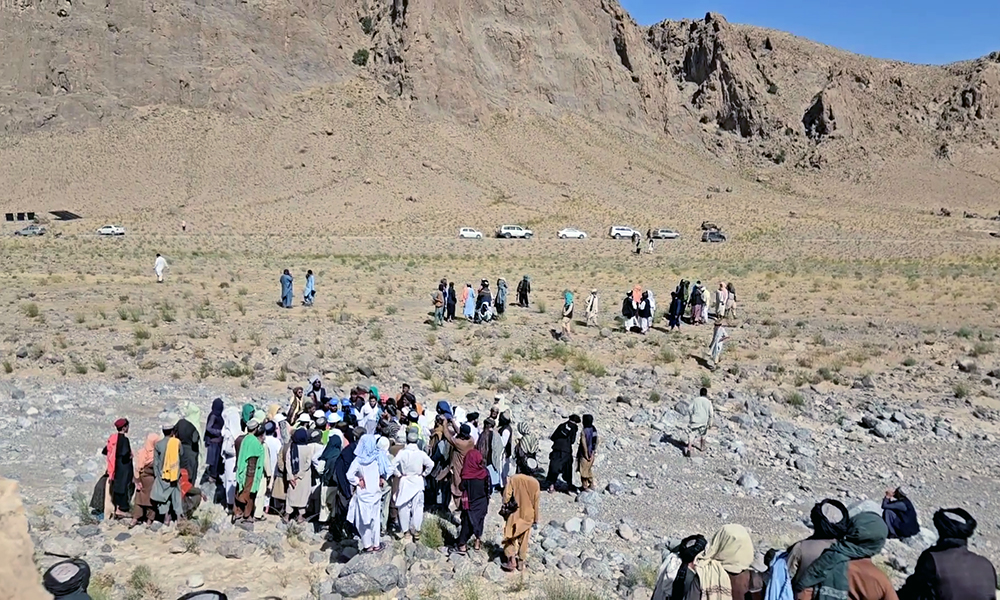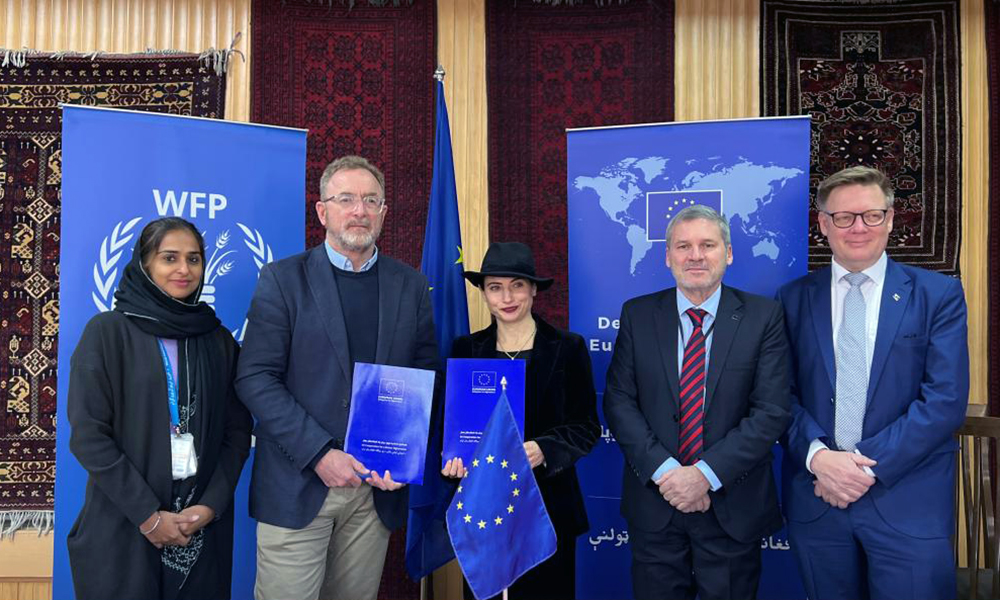Climate Change
Heatwaves: world reels from wildfires, floods as US, China discuss climate crisis

Asia, Europe and the United States baked under extreme heat on Monday as global temperatures soared toward alarming highs and U.S. leaders sought to reignite climate diplomacy with China.
The United States was scorched by record-setting heat in the West and South, lashed with flood-triggering rain in the Northeast, and choked by wildfire smoke in the Midwest, Reuters reported.
A heat dome parked over the western United States pushed the temperature in California's Death Valley desert to 53 Celsius on Sunday, among the highest temperatures recorded on Earth in the past 90 years.
Phoenix hit 45.5C on Monday, matching a historic record of 18 straight days over 43.3C with the forecast showing the record likely to extend for at least another week.
The U.S. heatwave coincided with extreme temperatures elsewhere throughout the Northern Hemisphere.
A remote town in China's arid northwest, Sanbao, registered a national record of 52.2C. Wildfires in Europe raged ahead of a second heat wave in two weeks that was set to send temperatures as high as 48C, while authorities in Italy and France issued heat-related health warnings.
Even in Phoenix, accustomed to hot weather, the prolonged bout of extreme heat is testing people and worrying officials. The international charitable organization Salvation Army has opened 11 cooling centers and sent out a mobile unit to deliver relief to homeless people who have difficulty reaching the sites.
"Extreme heat is Arizona's natural disaster. So for the Salvation Army, this is a disaster response," said Scott Johnson, a spokesperson for the organization in the U.S. Southwest.
The heat killed 425 people in the Phoenix-area's Maricopa County last year, so the Salvation Army mobile unit distributes urgently needed cold water, hats, sunscreen and hygiene kits to those in need.
"It feels like you're inside of a dryer, the dryer at the laundromat. And it's suffocating," said Cristina Hill, an unhoused woman who benefited from the outreach on Monday and said she suffered a heat stroke last year. "I cry all the time. I yell at the heat."
Another unhoused woman, Maritza Villegas, said she has gotten shaky and jittery from the heat, which provoked dry heaves.
"This means a whole lot - the world - because without water I'd be in the hospital right now," Villegas said of the assistance.
Scientists have long warned that climate change, caused by CO2 emissions from burning fossil fuels, will make heat waves more frequent, severe and deadly. They say governments need to take drastic actions to reduce omissions to prevent climate catastrophe.
The European Union's Copernicus Climate Change Service says 2022 and 2021 were the continent's hottest summers on record.
The extreme global temperatures underscored the urgency in talks that resumed between China and the United States on climate change, especially as scientists say the target of keeping global warming within 1.5 degrees Celsius of pre-industrial levels is moving beyond reach.
U.S. climate envoy John Kerry met Chinese counterpart Xie Zhenhua in Beijing, urging joint action to cut methane emissions and coal-fired power.
"In the next three days, we hope we can begin taking some big steps that will send a signal to the world about the serious purpose of China and the United States to address a common risk, threat, challenge to all of humanity created by humans themselves," Kerry said.
"It is toxic for both Chinese and for Americans and for people in every country on the planet."
Prolonged high temperatures in China are threatening power grids and crops and raising concerns about a repeat of last year's drought, the most severe in 60 years.
Typhoon Talim was gaining strength and due to make land at night along China's southern coast, forcing the cancellation of flights and trains in the regions of Guangdong and Hainan.
In South Korea, torrential rains left 40 people dead as river levees collapsed causing flash floods. They followed the heaviest recorded rain in the capital Seoul last year.
An unrelenting heatwave continued in Europe as well, Reuters reported.
Italy's health ministry on Monday issued red weather alerts - signaling a possible health threat for anyone exposed to the heat - for 20 of the country's 27 main cities on Tuesday, with the number expected to rise to 23 on Wednesday.
France's public health agency said the current stretch of hot weather would probably hospitalize or kill "many" people, as heat waves have done almost every summer since 2015. The World Meteorological Organization said the extreme heat and rainfall was expected to extend into August.
"In many parts of the world, today is predicted to be the hottest day on record," tweeted Tedros Adhanom Ghebreyesus, director-general of the World Health Organisation.
"The #ClimateCrisis is not a warning. It's happening. I urge world leaders to ACT now."
As many as 61,000 people may have died in Europe during heat waves last summer, with a repetition feared this season.
"My worry is really health - the health of vulnerable people who live just below the rooftops of houses which are not prepared for such high temperatures," said Robert Vautard, a climate scientist and director of France's Pierre-Simon Laplace Institute. "That could create a lot of deaths."
Climate Change
Kandahar’s Takhtapul district hit hard by ongoing drought
Afghanistan has experienced three consecutive years of drought, including the most devastating drought in 30 years in 2021 and 2022.

Residents of Takhtapul district of Afghanistan’s Kandahar province say they are struggling to survive amid an ongoing drought that has devastated their crops.
This rural community mainly relies on agriculture to survive but climate change has virtually ended any hopes of farming.
Afghanistan has experienced three consecutive years of drought, including the most devastating drought in 30 years in 2021 and 2022.
Climate experts predict that by 2050, 90% of its territory will be affected by drought.
Afghanistan is one of the ten countries most vulnerable to climate change. It's also ranked fourth in overall disaster risk.
Takhtapul residents have spoken out about their plight and said they have sustained extensive losses due to the drought
They said in the past they had made a living off farming, but now due to the severe lack of water, their land has become barren.
They also said this is forcing their youth and younger generation to find work in other provinces or outside the country.
Abdullah, a resident of Takhtapul district of Kandahar, said: "Our youths have gone to Pakistan and other provinces in search of work due to unemployment and drought. There they have wheelbarrows [for day labourer work] or they do other jobs."
On the other hand, local officials say that they are trying to reduce unemployment by launching development projects in this district.
Along with droughts and lack of work for young people, the breakdown of roads, lack of health centers and lack of suitable places for education are among the problems that the residents of this district want to solve.
Climate Change
EU pledges €15 million to WFP to help mitigate climate crisis impact on Afghans

The United Nations World Food Programme (WFP) has welcomed a €15 million (US$15.8 million) contribution from the European Union (EU) for its climate related activities in Afghanistan.
According to a statement issued by the EU on Thursday, this contribution will help local communities prepare for natural disasters and face the devastating effects of climate change, and support farmers for more productive and sustainable agriculture.
So far this year, more than 160,000 people have been affected by flooding in Afghanistan. Floods have destroyed almost 20,000 homes, and thousands of hectares of agricultural land.
“The European Union is committed to assisting the people of Afghanistan in adapting to climate change, which is severely threatening food security and livelihoods notably of rural communities, said the EU Chargée d’Affaires to in Afghanistan, Veronika Boskovic Pohar.
“Climate-related shocks also exacerbate host communities’ capacity to support internally displaced people and returnees from neighboring countries, and they discourage farmers in poppy-cultivating areas from sustainably shifting to licit crops.
“This latest contribution increases the European Union’s steady support to WFP’s resilience programme in Afghanistan to a total EUR 85.1 million since 2022”, she said.
Harald Mannhardt, WFP Deputy Country Director in Afghanistan, said: “This latest funding from the European Union comes at a critical moment as WFP earlier this year was forced to halt projects across the country due to a massive funding shortfall.”
Afghanistan is currently ranked seventh on the Notre Dame Global Adaptation Index of countries most vulnerable and least prepared to adapt to climate change.
Climate Change
Malaysia records six months of rain in just five days
One of the worst hit areas was Kelantan which recorded 1,442mm of rain between November 26 and 30

Six months worth of Malaysia’s average annual rainfall fell within five days across the east coast of the country last week, Prime Minister Datuk Seri Anwar Ibrahim said early Tuesday.
One of the worst hit areas was Kelantan which recorded 1,442mm of rain between November 26 and 30.
Ibrahim said the high rainfall led to flooding that forced a large number of people in Kelantan and Terengganu to be evacuated.
The recorded rainfall at Irrigation and Drainage Department stations in Tanah Merah and Tumpat, exceeded 1,167mm in just five days.
“According to the Malaysian Meteorological Department (MetMalaysia), the reading (in Kelantan) was at 1,442mm, an extraordinarily high level of rainfall. In Terengganu, MetMalaysia’s Besut station recorded 1,761mm of rain during the same period.
“Overall, the (average) rainfall was 1,349mm, far beyond our expectations,” Anwar told the Dewan Rakyat (Parliament) on Tuesday.
He also said the government is preparing for the forecast monsoon surge as announced by MetMalaysia, expected to start after Dec 8.
By Tuesday, some residents in the town of Tumpat were returning to submerged homes and shops as deadly floodwaters eased in some areas.
People who returned to their homes found many had collapsed, with parts of walls, roofs and broken furniture lying scattered in pools of water.
Muhamad Alim, a 56-year-old shopkeeper whose food store was inundated, recalled fast-rising waters in his home and his grandchildren crying as the flood surged on Saturday night.
"Electricity was cut off, and there was no water supply. So, we were stuck, sitting there as if we were in the middle of the sea, surrounded by water," he told Reuters.
"You could hear the sound of water rushing cutting through the silence of the night."
Six people have died in Malaysia and more than 150,000 were evacuated during the height of the floods last week, government data showed.
In Thailand, the death toll is 25, and more than 300,000 households were still affected, the interior ministry said.
The number of people in temporary shelters in Malaysia fell to just under 95,000 on Tuesday morning, though the authorities remain on guard for a second wave of floods this week.
Malaysia's Meteorological Department expects a wind convergence to begin on Tuesday, potentially bringing heavy showers, with a monsoon surge to follow on Dec. 8.
In Thailand, the Meteorological Department warned people in the south of the country to beware of heavy to very heavy rains and possible flash flooding and overflows from Dec. 3-5.
-

 Sport5 days ago
Sport5 days agoZimbabwe’s opening ODI against Afghanistan abandoned
-

 World4 days ago
World4 days agoNorth Korean troops suffer 100 deaths, struggling in drone warfare, South Korea says
-

 Latest News2 days ago
Latest News2 days agoAfghan men must stand with women to support viable future of country: US envoy
-

 Latest News4 days ago
Latest News4 days agoTwo horror accidents on Kabul-Kandahar highway leave 52 dead
-

 Sport3 days ago
Sport3 days agoAfghanistan crush Zimbabwe by 232 runs in second ODI
-

 Regional5 days ago
Regional5 days agoIran’s president to make rare visit to Egypt for D-8 summit
-

 International Sports4 days ago
International Sports4 days agoLanka T10: Kandy Bolts in at 4th spot in playoffs after thrilling day
-

 World5 days ago
World5 days agoNATO takes over coordination of military aid to Kyiv from US, source says
























